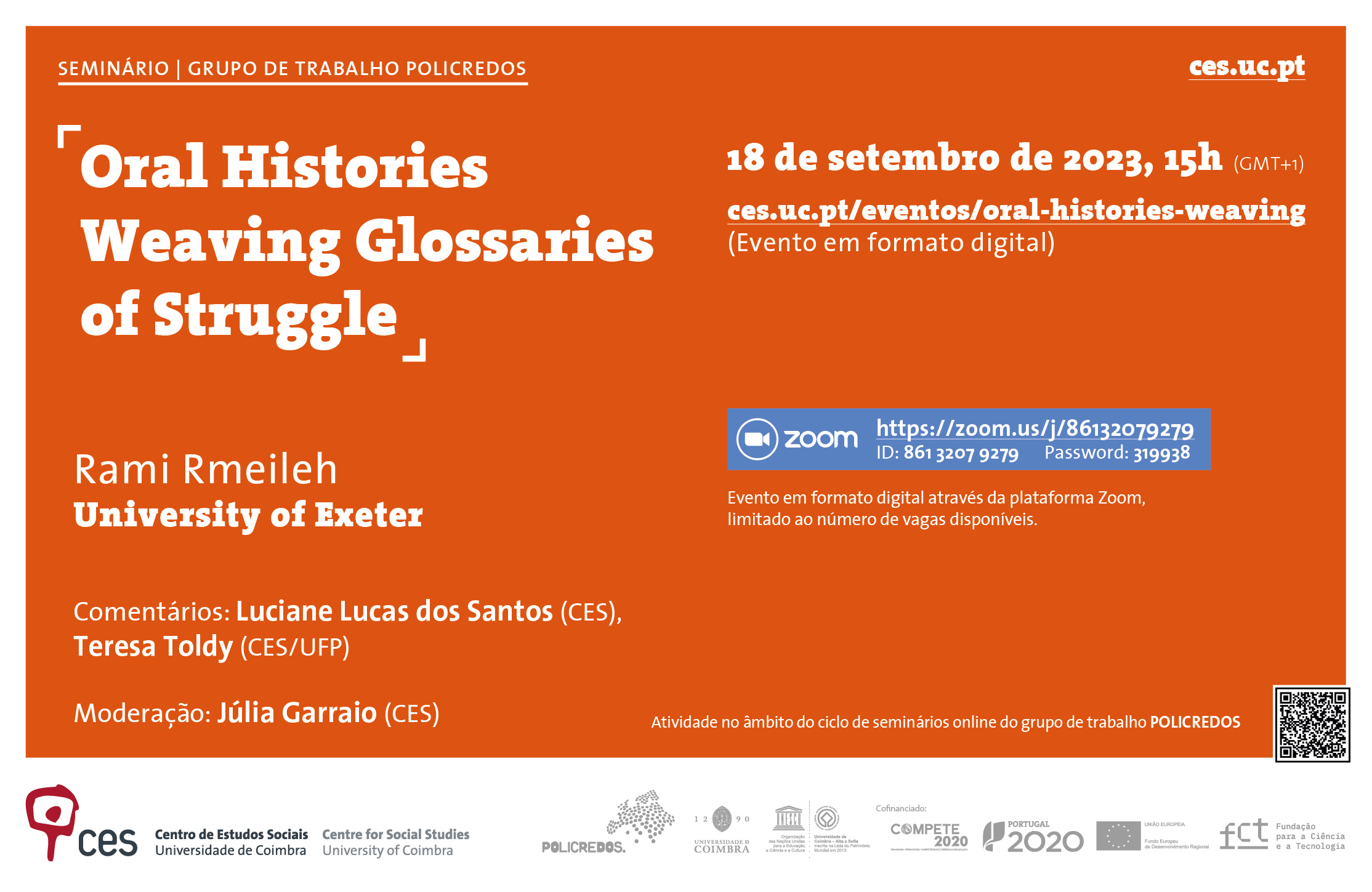POLICREDOS - Religions and Society
Seminar| GRUPO DE TRABALHO POLICREDOS
Oral Histories Weaving Glossaries of Struggle
Rami Rmeileh (University of Exeter)
September 18, 2023, 15h00 (GMT+1)
Online
Commentators: Luciane Lucas dos Santos (CES) & Teresa Toldy (CES/UFP) | Moderation: Júlia Garraio (CES)
Overview
In this webinar, I explore a discourse of struggle uncovered from an oral history archive, shedding light on the experiences of six Palestinian women from Ein El Helwe during the 1982 Israeli invasion of Lebanon. These oral testimonies not only amplify local counternarratives to dominant written accounts on conditions of extreme subjugations but also highlight the voices of Palestinian women as generators of underrepresented and dismissed shared knowledge. In line with Edward Said's question of "who has the permission to narrate?", this study expands the inquiry to encompass who has permission to critique and produce knowledge. Moving beyond elitist traditions of written academic critique, I emphasize the significance of approaching oral history as a generative site for repressed epistemologies, wherein people's narratives serve as vehicles for decolonial knowledge production. Applying a critical and transdisciplinary lens, the study seeks to uncover the words repeatedly used by Palestinian refugee women in Ein El Helwe in their discourse of struggle. By examining these words, glossaries of struggle intricately linked to land, community, and virtues emerge. These glossaries challenge oversimplified and binary discourses of trauma/resilience imposed from external perspectives. Such biomedical technical models neglect the historical and political conditions under which suffering is produced, while diminishing the agency of the oppressed and portraying Palestinians as apolitical, passive, and pathological. Consequently, I argue that theorists working with Palestinians, who are unfamiliar with Palestinian discourse, risk overlooking the shared meanings of struggle embedded in Palestinian language and practices. Language, in this context, encompasses the privileged medium through which we make sense of things and produce meaning. Learning this language entails grasping its discursive role, its relational, historical, and contingent nature. The analysis of Palestinian women's discourse reveals a unique language manifested through glossaries of struggle—an assemblage of non-Eurocentric words that defy adequate expression within Eurocentric critical theory or languages. These words intricately interweave glossaries that illuminate the multifaceted struggle of Palestinian refugee women in Ein El Helwe camp, encompassing moments of suffering, transformation, joy, fear, hope, and a resolute belief in justice and humanity, driven by a profound connection to the land.
Bio note
Rami Rmeileh is a Palestinian social psychologist, currently pursuing a doctorate at the Institute of Arab and Islamic Studies, University of Exeter. Prior to his academic journey, he contributed his expertise to various political and humanitarian organizations. Rmeileh's research revolves around the indigenous Palestinian concept of sumud, which serves as a liberatory analytical tool, challenging oppression in Palestinian spatial and temporal struggles. Through his work, he advocates for decolonization, blending academia and activism, and highlighting Palestinian knowledge production at the intersection of cultural studies and social liberation psychology.
______________
This activity will be provided through Zoom platform and does not require registration. Participation is limited to the number of places available >> https://zoom.us/j/86132079279 | ID: 861 3207 9279 | Password: 808241
Please keep the microphone on mute until the discussion is open. The host may remove disruptive participants.
Open activities in digital format, such as this one, do not grant a declaration of participation. Such document will only be guaranteed in events with prior registration and regulated access.


